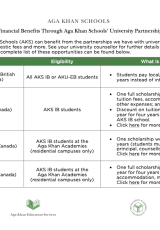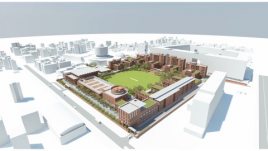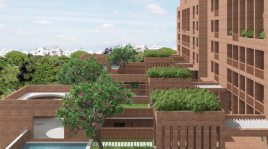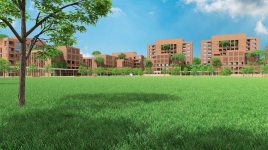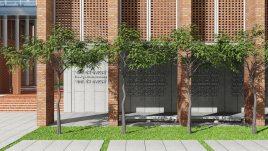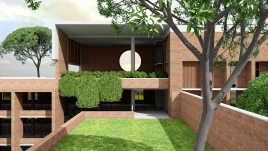Best 'Future Education Project': Recognising excellence in design
The design for the upcoming Aga Khan Academy in Dhaka, Bangladesh has won the award for best ‘Future Education’ project at the World Architecture Festival 2017, held on 15-17 November 2017 in Berlin, Germany.
The award recognises the excellence of the school’s design as well as the project’s intention to generate positive social impact, which emanates from the mission and values of the Aga Khan Academies and the wider Aga Khan Development Network (AKDN).
A collaboration between Rafiq Azam of Shatotto in Dhaka and Feilden Clegg Bradley Studios in London, the Academy will be the fourth school in the integrated network of Aga Khan Academies being established in 18 locations across Africa, South and Central Asia, and the Middle East, with the aim of developing ethical home-grown leaders. Construction of the new Academy is expected to begin in 2018 with classes for students planned to start in 2020.
The Academies, as a global network of day and residential schools, are situated in different contexts in various regions of the world. The design process for each Academy therefore needs to achieve a delicate balance between adhering to network-wide requirements and the flexibility to tailor these requirements to local needs. Ensuring that each Academy relates closely to its cultural and geographic context means looking beyond aesthetics – it requires consideration of local climate, building materials, construction techniques and cultural symbols.
Ian Taylor, FCBS Managing Partner said: “The design is developing to encompass local construction technology, locally sourced materials and components wherever possible. Climatic challenges relating to humidity control and management of conditions in the monsoon season are addressed through the development of appropriate low energy solutions to ventilation and cooling.”
Situated on a 20-acre site near the centre of Dhaka in an area of rapid urbanisation, the Academy’s masterplan draws inspiration from historic educational institutions, including the earliest Buddhist universities in the region. A central maidan (communal recreation space) has been included to provide a large open space, and is the symbolic and tranquil core of the campus. In light of increasing density, the Academy’s maidan is protected from tall neighbouring developments by positioning Academy buildings of height on all sides, which have been oriented to maximise sustainability and environmental performance.
Moyez Alwani, Head of Design for the Aga Khan Academies further explains: “Throughout the design of this Academy, we have been concerned with matters relating to the hyper-densification of the city, and our response has been to develop a masterplan that makes a symbolic statement about the importance of green open space. In addition, we are actively taking significant steps to preserve the traditions of building in Bangladesh which will serve as an antidote to the homogenising impact of modernity which often mute wonderfully rich traditions and craft.”
Continuing the long traditions of learning in Bangladesh, the campus has been designed to promote varied educational opportunities across a multitude of indoor and outdoor covered spaces. Oversized walkways used as external teaching areas, landscape designed to encourage interaction and collaboration, a range of amphitheatres for multi-functional gathering and informal outdoor seminar spaces will provide opportunities for extending learning amongst students. The aesthetic character of the buildings will also convey meaning and provide connections with local culture and heritage. Drawing on local precedents and expertise, the building façades will utilise locally-made bricks, with the aim of reinvigorating Bangladesh’s longstanding tradition of brick building in the face of modern approaches and imported architectural styles.
Moyez explains, “Our hope is that by emphasising the importance of inherited traditions and connecting these with leading pedagogical design principles, our students will better understand their place in a modern world.”
The Aga Khan Academy Dhaka represents a significant investment in education by the AKDN for the benefit of Bangladesh. It will become a new national asset for the whole country – and for its broad educational community.
While every Academy exists in a certain locale and context, each is linked in its ability to foster the development of young individuals who both will excel academically, and go on to become global leaders in their respective fields of endeavour. Salim Bhatia, Academies Director, explains: “We offer not just an education preparing a student for the global competition but also one that connects them to their language, their literature, history and heritage so that they may provide leadership in their own contexts with solutions that take into account both global best practices but also their own contexts.”
His Highness the Aga Khan said at the foundation stone-laying ceremony in Dhaka, “This new Academy will be an important node in a network of 18 schools throughout the developing world, providing world class education for young men and women from all backgrounds, irrespective of ability to pay. It will be a remarkable place to go to school”.
publications
